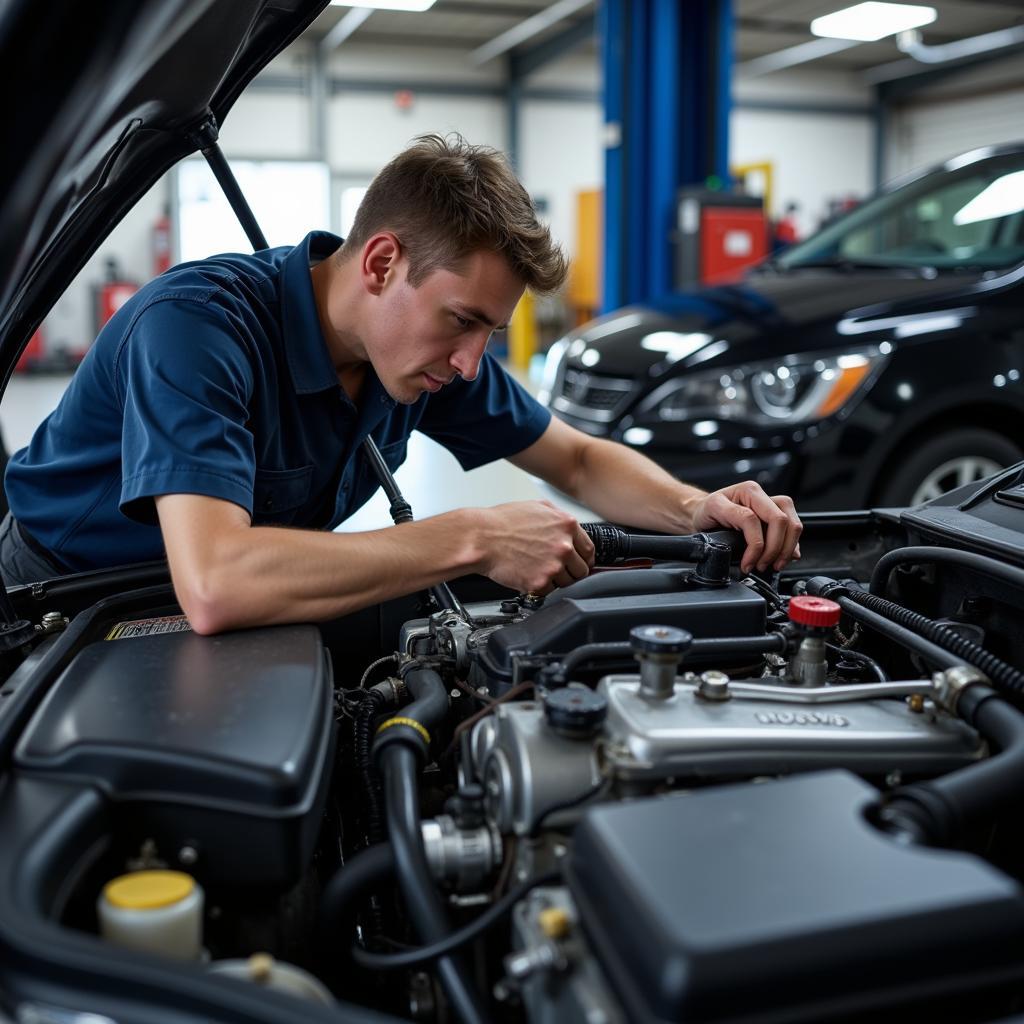Should I Get My Car Serviced at a Dealership?
You’re due for an oil change and your car needs a general check-up. You might be wondering, “Should I Get My Car Serviced At A Dealership?” It’s a common question car owners ask themselves, weighing convenience against potential cost savings. While dealerships offer familiarity and specialized knowledge, independent mechanics and specialized car service centers present compelling alternatives.
Let’s navigate the pros and cons of each option to help you make the best decision for your vehicle and your wallet.
Dealership Service: The Perks and the Pitfalls
Taking your car back to the dealership where you purchased it can seem like the natural choice. After all, they should know your car inside and out, right? While that’s partially true, there are both advantages and disadvantages to consider.
Pros of Dealership Service:
- Specialized Technicians: Dealerships employ mechanics trained specifically on their brand of vehicles. This means they’re well-versed in the intricacies of your car’s make and model.
- Genuine Parts: Dealerships use original equipment manufacturer (OEM) parts, guaranteeing compatibility and often coming with a warranty.
- Maintaining Warranty Coverage: Some manufacturers require dealership servicing to maintain the validity of your new car warranty.
- Convenience and Amenities: Many dealerships offer comfortable waiting areas, shuttle services, and loaner vehicles, minimizing disruptions to your day.
Cons of Dealership Service:
- Higher Costs: Dealership labor rates tend to be significantly higher compared to independent mechanics.
- Potential Upselling: Dealerships may be more likely to push unnecessary repairs or services to boost their profits.
- Limited Flexibility: Dealerships often have less flexible scheduling options compared to smaller shops.
Exploring Alternatives: Independent Mechanics and Specialized Shops
Moving away from the dealership opens up a world of choices for car servicing. Independent mechanics and specialized shops offer competitive advantages that might better suit your needs.
Pros of Independent Mechanics:
- Cost Savings: Independent mechanics typically have lower labor rates and may offer more competitive pricing on parts.
- Personalized Service: Smaller shops often provide a more personalized experience, building relationships with their customers.
- Greater Flexibility: Independent mechanics are usually more accommodating with scheduling and may offer after-hours appointments.
Cons of Independent Mechanics:
- Variable Expertise: The skill and specialization of independent mechanics can vary greatly. It’s crucial to find a reputable mechanic with experience working on your car’s make and model.
- Parts Sourcing: While some independent mechanics use OEM parts, others may use aftermarket options, which can impact performance and warranty coverage.
Pros of Specialized Shops:
- Expert Knowledge: Specialized shops focus on specific types of vehicles or services, such as transmission repair or European car maintenance. This niche expertise can be invaluable for complex repairs.
- High-Quality Work: These shops prioritize quality and often have a strong reputation within their area of expertise.
Cons of Specialized Shops:
- Limited Scope: Specialized shops only handle specific services or car types, limiting their use for general maintenance.
- Potentially Higher Costs: Due to their expertise, specialized shops may have higher labor rates than general independent mechanics.
Making the Right Choice: Factors to Consider
Now that you have a clearer understanding of the options, let’s pinpoint the key factors to help you decide where to get your car serviced:
- Warranty Status: If your car is under warranty, carefully review the terms to see if dealership service is mandatory.
- Car’s Age and Condition: Newer, more complex vehicles might benefit from the specialized knowledge of dealerships. Older cars with known issues might be better served by an experienced independent mechanic.
- Type of Service Required: Routine maintenance like oil changes or tire rotations can often be handled by independent mechanics. Complex repairs or specialized services might require a dealership or specialized shop.
- Budget: If cost is a major concern, independent mechanics usually offer the most competitive pricing.
- Your Comfort Level: Ultimately, choose the option you feel most comfortable with, whether it’s the familiarity of a dealership or the personalized service of an independent mechanic.
 Car owner talking to a mechanic about car repairs
Car owner talking to a mechanic about car repairs
Tips for Finding a Reputable Mechanic
Whether you choose a dealership, an independent mechanic, or a specialized shop, finding a reputable and trustworthy service provider is essential. Here are some tips to guide you:
- Ask for Recommendations: Seek recommendations from friends, family, or online communities.
- Check Online Reviews: Browse online reviews on platforms like Yelp, Google, or specialized automotive forums.
- Verify Certifications and Experience: Look for mechanics certified by reputable organizations, such as ASE (National Institute for Automotive Service Excellence), and inquire about their experience with your car’s make and model.
- Get Multiple Quotes: Don’t hesitate to get quotes from several different service providers to compare pricing and services.
- Communicate Clearly: When discussing your car’s issues, be clear and detailed. A trustworthy mechanic will listen attentively and explain the recommended repairs thoroughly.
Conclusion
The decision of where to get your car serviced is a personal one. While dealerships offer specialized knowledge and genuine parts, independent mechanics and specialized shops provide cost savings, personalized service, and niche expertise. By weighing the pros and cons, understanding your car’s needs, and conducting thorough research, you can confidently choose the best option for your vehicle and your budget.
Remember, regular car maintenance is key to extending the life of your vehicle and ensuring safe and reliable transportation.

